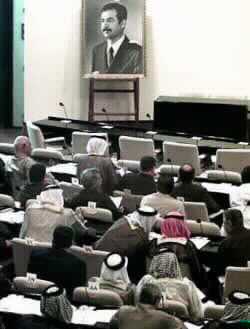Britain set itself apart from top ally the United States, which has made a "regime change" in Baghdad a priority, saying on Thursday its main aim in Iraq was to get weapons inspectors back in. In comments that underlined differences between President Bush and London, Foreign Secretary Jack Straw said the main threat was from Iraqi President Saddam Hussein's suspected capability with weapons of mass destruction.
"What everybody is concerned about...is particularly the threat that Saddam Hussein poses from both his capability and his record to the security of the region and the security of the world," Straw told BBC radio.
"The best way of trying to isolate and reduce that threat is by the introduction of weapons inspections," he said. "The crucial issue here is weapons inspectors."
Bush by contrast has made the ousting of Saddam a top priority, saying the Iraqi leader is developing weapons of mass destruction and must be stopped before he can use them against the United States and its allies, or share them with terrorist groups.
British Prime Minister Tony Blair has signaled he would back U.S.-led military action, but faces growing opposition from members of his own left-of-center Labour Party, church leaders and, according to some reports, members of his own cabinet.
Challenged on whether there was any international coalition that would back military action against Iraq, Straw ducked the question. He instead said: "What there is, is an overwhelming international consensus against what Saddam Hussein has been doing and failing to do in Iraq."
Bush said on Wednesday that he would continue to consult with his allies on the issue of Iraq but again repeated his view that "regime change is in the interests of the world."
Straw said Britain would of course be happy if Saddam were to be removed, but stressed: "The key part of our approach is to get the weapons inspectors back.
"We have to say military action remains an option...because of the threat posed by Saddam Hussein. But if there is another way of dealing with that threat then plainly the case for military action recedes," he said.
PHOTO CAPTION
Iraq's Parliament is seen August 19, 2002 after they voted unanimously to back President Saddam Hussein's nomination to run unopposed for another seven year term. Britain set itself apart from top ally the U.S., which has made a "regime change" in Baghdad a priority, saying on August 22 its main aim in Iraq was to get weapons inspectors back in. (Faleh Kheiber/Reuters)
- Author:
& News Agencies - Section:
WORLD HEADLINES


 Home
Home Discover Islam
Discover Islam Quran Recitations
Quran Recitations Lectures
Lectures
 Fatwa
Fatwa Articles
Articles Fiqh
Fiqh E-Books
E-Books Boys & Girls
Boys & Girls  Hajj Rulings
Hajj Rulings Hajj Fatwas
Hajj Fatwas














